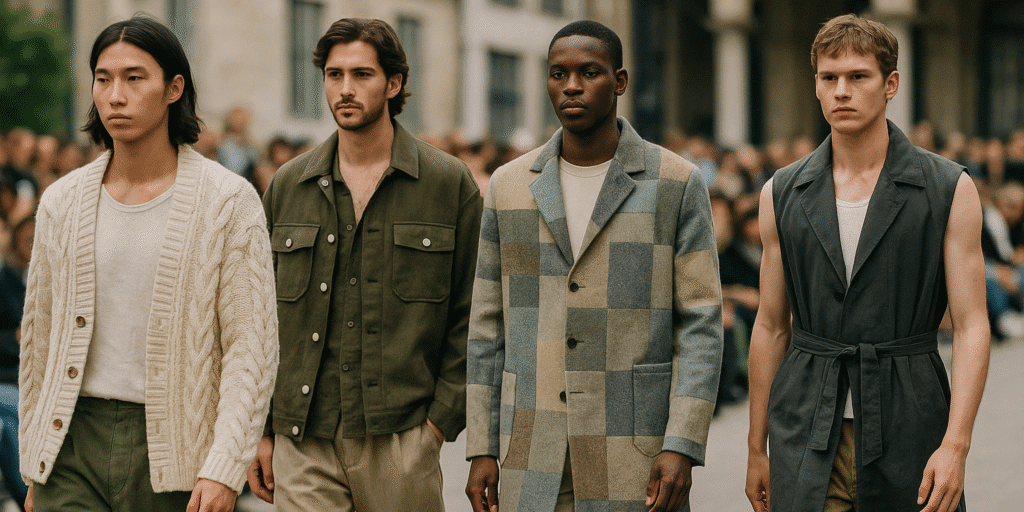Copenhagen Fashion Week, held from February 5 to 9, 2024, reaffirmed its position as a global leader in sustainable fashion, with this year’s winter edition placing a sharp focus on eco-conscious menswear. Known for its commitment to environmental responsibility and progressive design, the event brought together leading Nordic and international designers, buyers, and sustainability advocates for four days of runway shows, trade exhibitions, and discourse on the future of fashion.
The biannual event, which has grown into a major influencer on the global fashion calendar, hosted its signature showcases alongside major trade fairs CIFF (Copenhagen International Fashion Fair) and Revolver, both of which served as hubs for ethical fashion innovation. The 2024 February edition stood out for its bold integration of minimalist style, ethical sourcing, and circular production strategies—especially within menswear collections.
Aesthetic Meets Responsibility
Menswear collections on display reflected a clean, utilitarian Scandinavian design ethos paired with a pressing commitment to sustainability and functionality. Designers leaned into monochrome palettes, tailored silhouettes, and versatile layering, all crafted from low-impact materials. From recycled cotton and repurposed nylon to biodegradable buttons and plant-based dyes, the runway emphasized that elegance and environmental awareness are no longer mutually exclusive.
Danish label Soulland, a standout participant, unveiled a collection grounded in circular design principles, including garments made from deadstock fabrics and pieces that were 100% recyclable. Meanwhile, mfpen, known for its understated, architectural tailoring, showcased a menswear line made entirely from surplus textiles sourced from Italian mills. The message was clear: creativity thrives within constraints when guided by purpose.
CIFF and Revolver: Platforms for Eco-Innovation
The trade shows CIFF and Revolver served as essential forums for brands committed to climate-conscious business models. These platforms allowed designers and retailers to showcase not only products but also transparency reports, carbon offset strategies, and upcycled capsule collections.
Brands like KnowledgeCotton Apparel, Norse Projects, and Forét presented forward-thinking lines built around regenerative cotton farming, fair trade labor practices, and carbon-neutral shipping models. Buyers were not only looking at cut and color—they were examining supply chains, material provenance, and sustainability metrics as part of the decision-making process.
What emerged from the trade fairs was an understanding that the menswear market, long rooted in tradition and conservatism, is now being reshaped by environmental values and consumer expectations for accountability.
Industry Conversations and Consumer Shifts
Beyond the runway, Copenhagen Fashion Week hosted panel discussions and workshops addressing topics such as climate policy in fashion, textile waste reduction, and digital solutions for sustainable production. One of the event’s most engaging sessions focused on how transparency and traceability are becoming essential selling points for menswear brands, especially among Gen Z and millennial consumers.
Event organizers reaffirmed their Sustainability Action Plan 2020–2025, which mandates that participating brands meet minimum sustainability requirements to showcase at the event. This includes responsible sourcing, minimal packaging waste, and detailed lifecycle assessments. By enforcing these benchmarks, Copenhagen Fashion Week remains one of the few fashion weeks actively pushing the industry toward measurable change.
A Model for the Future
As the February 2024 edition concluded, Copenhagen Fashion Week left a resounding message for the global fashion industry: sustainability is no longer a luxury—it is a necessity and an expectation. Through minimalist yet modern menswear, ethical craftsmanship, and a culture of transparency, the event demonstrated how fashion can evolve responsibly without compromising on innovation or style.
Copenhagen’s influence continues to ripple outward, encouraging other fashion capitals to reconsider their standards, and affirming that the future of menswear is not just stylish—but sustainable.
